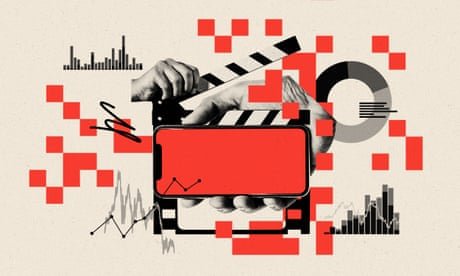The end credits are still rolling when I open up my JustWatch app to mark Luca Guadagnino's seductive psychodrama A Bigger Splash as "Seen", complete with satisfying green tick. I click on my Letterboxd account to do the same, logging the date I watched it, before scrolling back and finding my sense of achievement disintegrate into guilt that I have only managed to watch a measly two films in the whole of April.
I am one of millions for whom religiously tracking their cultural intake has become as instinctive as recording their steps, workouts, calorie count or periods. Letterboxd - dubbed "the social network for film-lovers", who can log, review and discuss films with other members - recently hit 6 million members. The Amazon-owned GoodReads, which has been doing the same for books for the past 15 years, has a community of 140 million, with 5.1 million thus far pledged to take part in its 2022 Reading Challenge in which users set a target number of books to read over 12 months. Meanwhile, IMDb has more than 1 billion user reviews logged. Like wellness before it, cultural consumption has become yet another opportunity for us to measure, analyse and optimise our lives using cold, hard data.
I first started logging my cultural intake as an attempt to impose order on the deluge of content available to us, but I quickly succumbed to the buzz of box-ticking. Dr Karen Shackleford, editor of the Psychology of Popular Media journal, compares it to the positive feedback signals we get while playing video games: "It's kind of amazing what little amount of reward will motivate people," she says. "It's dopamine in our brain, and it's like a pursuit chemical so it keeps you playing."
Despite the positives of this - that we are motivated to make space for things we enjoy - it doesn't exactly feel in the spirit of great art to be gamifying it in this way. And the flip side of those gratifying "Watched" lists is their ominous (and guilt-inducing) "To watch" opposite numbers. What ought to be an enticing smörgåsbord of future entertainment begins to look like an impossible mountain to climb.
This is only amplified by tracker apps encouraging public sharing, as demonstrated by the Spotify Wrapped lists of people's most-listened-to tracks of the year that flood social media every December. Professor Deborah Lupton, an expert on the self-tracking phenomenon and author of The Quantified Self, explains: "We've got used to this idea that it's good to share our habits online, and that it's nice to get feedback." But there could be an adverse effect if it becomes "all about competition. I think that probably is a way of diminishing the pleasure."
If your account on any of these platforms is public, there might even be performative pressure to curate your track record at the expense of honesty - say, logging The Power of the Dog but omitting Space Jam: A New Legacy.
Lupton believes that the expansion of tracking from the health sphere to our cultural intake was inevitable: a result of our sharing economy coming together with the migration of the arts to streaming platforms that have monitoring baked into their technologies. "In many cases we have no idea what they know about us," she says. "But for things like Spotify or GoodReads, people are able to generate their own data." And for those fully on board with the idea of tracking ourselves with technology, the more data we can collect, the better we know ourselves. As Lupton explains: "We have this mentality that metrics are more accurate or more insightful than other ways of learning about ourselves."
That chimes with the fact that a popular feature of these apps is analysis: neat visualisations that will show you precisely who your favourite artists, actors and genres are. It is magnified when we are encouraged to assign a rating. "I understand the value of numbers," says Dr Shackleford. "But sometimes I feel like it's too reductionist. Everything you put a number on is hopefully correlated to a deeper reality but I can't really quantify these things. Is Pride and Prejudice a five but Northanger Abbey a four? I don't know! I would like to think that Jane Austen would find that appalling. It's a work of art. It has value no matter what. Even though I'm a quantitative researcher, it seems off."
Instead, she urges caution in accepting any of these numbers at face value: "Maybe you didn't realise you watched five films with Colin Firth in, but just because you have, that doesn't mean he's your favourite actor. That's still a human thing. The data might give you a false impression."
That said, I can't help but feel envious when I talk to someone who has a record of their viewing habits for almost two decades. James Morgan registered his first vote for a film on IMDb on 11 April 2004, when he was in sixth form. Now 34, he has logged 2,267 films on the site. (His list is private - a means of cataloguing what he has seen rather than something done for clout). Where I was concerned that tracking our cultural intake might turn us into more passive consumers, Morgan argues that accessing his viewing has provided focus.
"It's trying to steer that compulsion to watch loads of films, rather than it being a bit aimless," he says. "I guess there's a perverse incentive pushing you to get that number to creep up and maybe that's to the detriment of watching things you've already seen and loved. At the same time, I'm not sitting down of an evening [thinking], 'Better watch a film and get my IMDb numbers up!'"
He does admit frustration at forgetting to log the odd film, though. "It actually pains me that occasionally I stumble across one [that I didn't register first time around]." It all might sound fastidious, but for Morgan one of the main appeals of keeping track is the opportunity for reflection: "I distinctly remember watching [classic zombie movie] Dawn of the Dead on the BBC and it blowing my mind. I can see now the day I voted for it was in November 2004. It's quite a nice thing sometimes to be able to look at."
Despite the clinical nature of sticking every film you've ever seen on to what is essentially a spreadsheet, it all suddenly sounds quite romantic to be able to scroll through a lifetime of loving film or books or television. Dr Shackleford agrees: "If I could magically have a list of every film I'd ever watched and when, I would want that! There are theories in psychology that you watch certain things based on the developmental stage that you are at, or because something is happening in your life that you want to either directly address or avoid."
Thus bad break-ups might be evidenced by a fortnight of weepy romcoms, or getting fired from a job by a month-long binge of revenge thrillers. The culture we choose to consume is more than just a sideshow; it's an impression of our lives - our emotional or mental states reflected in how we choose to spend our leisure time. In that sense, there is no "winning" however much tracking apps might push us towards that mindset. It's one thing to hit your goals on your exercise app, but culture is not something that can be "completed". There is no payoff with fireworks dancing across my screen as an app tells me: "CONGRATULATIONS! YOU HAVE WATCHED ALL THE FILMS!"
Instead, I need to start thinking of my tracking habit as a companion rather than a driving force: a loose guide to alleviate the tyranny of choice, a convenient memory jogger and a journal that I can dip in and out of. Because, however meticulously we collect the data on ourselves, ticking a box will never be representative of the subjective, intuitive, unpredictable and intangible ways in which we respond to culture. And that is where the real value lies.
























